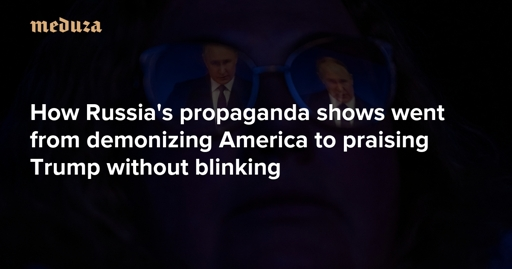'It’s all about raw, exaggerated emotion:' How Russia's propaganda shows went from demonizing America to praising Trump without blinking
'It’s all about raw, exaggerated emotion:' How Russia's propaganda shows went from demonizing America to praising Trump without blinking
'It’s all about raw, exaggerated emotion' How Russia's propaganda shows went from demonizing America to praising Trump without blinking — Meduza

Three years into the full-scale war in Ukraine, the Kremlin’s propaganda machine is still hard at work telling Russians that the invasion is justified, Ukraine and the West are to blame, and Vladimir Putin is acting in their best interests. But U.S. President Donald Trump’s first two months back in office have complicated this narrative. His efforts to rebuild ties with Moscow have led Russian state media and officials to swing from cursing the U.S. over the war to praising its president for his kind words about Putin and his dismantling of institutions like USAID. To unpack how Russian propagandists have handled this about-face,
[In an Q&A session, the independent journalist] Ilya Shepelin, who tracks pro-Kremlin media and formerly hosted the show “Fake News” on TV Rain, unpacks how Russian propagandists have handled this about-face.
[...]
Question: For more than a decade now, Russian propaganda has pushed the idea that America is Russia’s eternal enemy, and that U.S. policy is rooted in hatred and fear of our country. But the moment Trump said a few kind words about Putin, Russian TV suddenly forgot all about this existential standoff and started gushing over this “wonderful man” and the America that’s supposedly about to become great again. Were you surprised by this sudden shift?
Ilya Shepelin: I’m not sure there’s anything left that can still surprise me — and that’s a serious professional problem [...] So no, I’m not surprised that Russian propaganda suddenly started singing America’s praises. Especially since Trump’s own style of politics fits perfectly with how Russian propaganda operates. He’s not bothered by obvious contradictions. One day he’ll post that Zelensky is a dictator with a four percent approval rating, and a week later he’ll tell a reporter he never said or thought any such thing.
[...]
It’s all about raw, exaggerated emotion — pure and simple. The same kind you see with soccer fans. If something good happens — say, Trump says Putin’s a great guy and one of the greatest leaders ever — we celebrate and gush over the U.S. president. But the moment Trump decides to extend sanctions put in place by the previous administration, we’re suddenly tearing our hair out and ripping down the posters of him we just hung over our beds.
[...]
it’s not about full-scale mobilization [of Russian people] — it’s about offering narratives that help people make peace with what’s going on [the war]. Something like, “Look, politicians around the world are hypocrites — that’s even worse than what Putin’s doing. At least he’s doing it for Russia. The others are just scheming against us.”
[...]
“Scaling” is a key idea here [as the actual fighting in Ukraine is over small villages that few people have ever heard of]. How does Russian TV portray battle maps of some village in a random district of Donetsk? They act like like they’ve stretched a map of Europe across the screen. Just zoom in close enough, and it starts to feel like we’re not talking about a few square kilometers, but hundreds or thousands. Like it’s a world-shaping event. A massive conquest.
And really, the actual territory doesn’t matter much to the propaganda. What matters is the image of the army steadily advancing, day by day, while the enemy retreats in shame, losing one village after another. And to keep it from feeling like a toy war bought off AliExpress, they constantly show our soldiers fighting and dying heroically on the front lines.
[...]
They never talk about the number of casualties on [Russian state-controlled] TV [as Russia's casualty numbers are massive]. The last official figure the [Russian] Defense Ministry mentioned was, I think, five thousand. On TV, they’re always talking about the hundreds or thousands of enemy soldiers killed, constantly showing videos of them dying. And when they talk about fallen heroes, it’s always just a few, and they’ve either saved 20 people or killed 140 enemies before they died.
[...]
Russian society is highly atomized. The people who are fighting and dying went there voluntarily, for money that’s unimaginable to most of the country. And that helps remove the sense of personal connection to the tragedies of those who’ve died. It’s seen as the price for taking the risk.
[...]
[Russian general Andrey] Gurulyov is constantly saying insane things, like that we should drop a nuclear bomb on Britain or wipe out a quarter of Russia’s population because they’re all Western agents. But suddenly [when peace negotiation started with the US], this guy ended up on the blacklist of federal channels. He disappeared from the airwaves after he called Trump a “bandit” who shouldn’t be sitting at the same table [with Putin].
[...]
Now he’s having to appear on regional channels, popping up on [far-right Russian Orthodox news network] Tsargrad TV. And you can really see how his rhetoric has changed. Now he says, “Well, of course, we all want victory, but right now the U.S. is calling for a settlement, and when the U.S. accepts our terms, that’ll be the victory.
So, just by cutting someone off from federal airwaves, you can instantly change their [the people's] view of victory. Not long ago, he was demanding Odesa and Kyiv, and now he’s happy with recognition from the U.S. There’s no real issue with victory at all. Whatever they achieve in negotiations, that’s what they’ll portray as a victory.